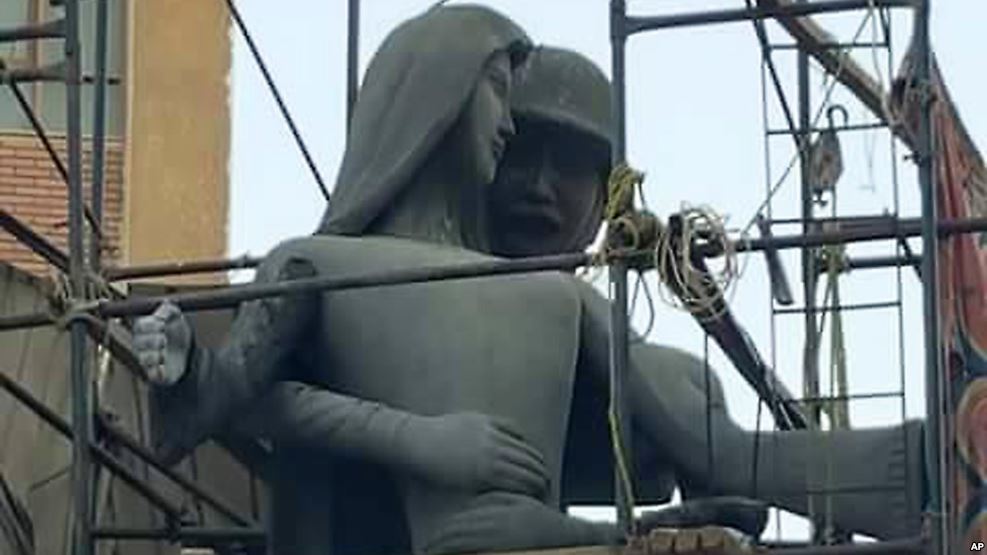
It seems that only in Egypt’s al-Sisi, nothing goes on the right track even “art”! A sculpture that appeared in one of the squares of an Upper Egyptian governorate in Egypt has raised many angry comments on the social media. The governor of Sohag Province -located in south Egypt- ordered changes to the sculpture after the residents complained that it was inappropriate.
The sculpture honoring fallen soldiers raised many complaints on the social media which said it appeared to depict an unwanted advance on a woman meant to symbolize the country.
The concrete sculpture, titled “Mother of the Martyr”, depicts a slender peasant woman, a traditional artistic representation of Egypt with her arms outstretched. A helmeted soldier is standing behind her, looking over her shoulder with his arms wrapped around her, according to Al-Akhbar.
Some critics of the Sohag statue, 8.5m high, said in their social media comments that the sculpture portrayed sexual harassment while others interpreted it as the country’s military seducing Egypt as represented by the peasant woman.
Sohag’s governor, Ayman Abdel-Moneim, has ordered an investigation into the commissioning of the sculpture by the local council of the town of el-Belina. He said his provincial government should have been consulted before the 250,000 Egyptian pound ($28,400) sculpture was commissioned.
In response, a group of lawyers in the city went further, demanding a criminal investigation into the head of the city’s government, saying the statue scandal wasted 250,000 EGP ($28,150) of public money.
In their complaint, the lawyers said the affair had “cast light” on what they said was endemic wastage of public money on similar projects, pointing to a costly scheme to install solar-powered fake light-up trees to illuminate the city’s streets.
In reference to the statue, the lawyers accused city administrator Adly Abu Aqil of “accusing others in an attempt to shift the blame away from himself,” bringing him to justice for explaining this misuse of public money.
The city said in a statement over the weekend that the “necessary amendments” to the statue were being carried out, and would not cost the city any extra money.
The statement said the statue had aimed to represent “the mother of a hero next to her son… As a result of the debate about the statute, it is being changed.”
Since al-Sisi military coup in 2013 against the first democratically elected President Mohamed Morsi, Egypt’s has been facing many crises and problems.
Al-Sisi,who has been portrayed as the country’s savior, has failed until now to fulfill his promises to the Egyptians, but on the contrary, he warned them of harsh times and austerity policies in light of the International Monetary Fund (IMF) Loan.
Egypt undergoes one of the harshest economic crises in its history. Hard currency shortage has escalated due to withdrawal in tourism and foreign investment as a result of political instability and lack of security.
Accordingly, the Central Bank of Egypt (CBE) devalued the Egyptian currency in March.The devaluation of the Egyptian pound and the shortage of foreign currency have flourished the black market on the currency expense and led to inflation.
In addition, the political life in Egypt has been locked by the al-Sisi regime that launched a massive crackdown on political opposition and human rights activists.
Moreover, al-Sisi’s government has witnessed a recent blow by the resignation of Minister of Supply and Internal Trade Khaled Hanafy amid the highest-profile corruption since Abdel Fattah al-Sisi came to power in 2014.
Hanafy’s resignation is the most senior-level fallout from a probe into whether millions of dollars intended to subsidize farmers were used to purchase wheat that did not exist.
Egypt’s supply ministry is the one responsible for a massive food subsidy program and the main state grain buyer, the General Authority for Supply Commodities (GASC).
In this context, members of the parliament, who formed a fact-finding commission to investigate the fraud, said “upwards of 2 million tonnes, or 40%of the locally procured crop, may be missing.”
A recent field study for the Egyptian Center for Media and Public Opinion “Takamol Masr” found that 74% of the Egyptians refuse the continuation of the al-Sisi regime while 11% only wanted the regime to continue and 15% don’t care about what is happening on the Egyptian scene.
The rejection of the al-Sisi regime is high within the age categories that are less than 40 reaching 81%, and it is relatively close for both males and females, according to the “Takamol Masr” study.
In the same context, The Economist has written its editorial, “The Ruining of Egypt” that the demographic, economic and social pressures in Egypt are relentlessly increasing and that al-Sisi is incapable of providing the sustainable stability to Egypt, the political regime also needs to be reopened.
The magazine considered that al-Sisi’s withdrawal from the political life is the hope gate for Egypt. The Economist continued saying, “Egypt’s political system needs to be reopened. A good place to start would be for al-Sisi to announce that he will not stand again for election in 2018.



